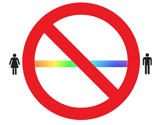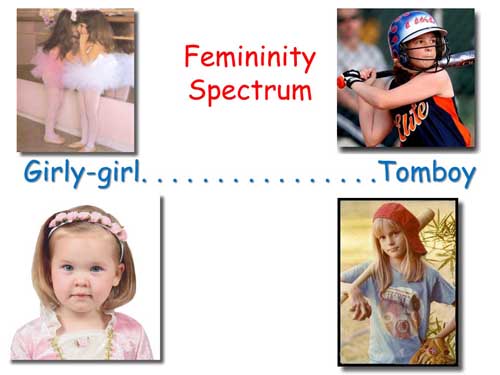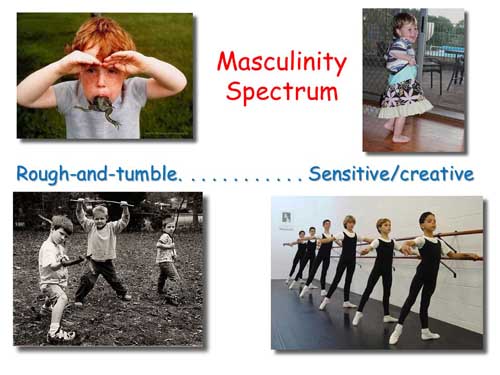I was reading your article about Gay Teen Suicides and Bullying, about how some people pray and pray for God to take away their gay feelings and there is a reason that he doesn’t that they don’t know about. I’d like to know what that reason is. My best friend committed suicide when we were both 18 because he couldn’t accept that he was gay. I learned to accept it and now I’m 36 and quite happy. Luckily, I have found a church that accepts me for who I am and I know that God loves me as does Jesus but I am always curious to hear the ideas and opinions of Christians on what the supposed cure for this condition might be.
First of all, ______, I am so very sorry to hear of your best friend’s suicide. I’m sure that has left a wound on your soul that troubles you to this day.
I want to VERY respectfully suggest that “accepting one’s gayness” is not the best solution to the grief and sadness that comes bound up in realizing one has same-sex desires. That would be like seeing the “check engine” light on your car and deciding to learn to live with it. I know the culture’s pro-gay message is that there’s nothing wrong with homosexuality so just accept it, but that’s not God’s position. Which leads me to answer your question: why would God not take away someone’s gay feelings?
First, because everyone has an area of weakness that makes it easier for us to recognize our need for God and depend on Him more fully, which is His design and intent for us. Some people have physical trials; others struggle with a weakness for alcohol, drugs, or other forms of self-medication. Some struggle with same-sex attractions. Whatever our area of weakness, this is the very avenue by which God can reveal Himself to be strong, to be enough for us. And it is the best way for God to develop us into the people He made us to be, permeated with Christ like character and maturity.
So often, people pray and ask God to relieve their symptoms and make their lives easier (and this, of course, goes way beyond asking God to take away gay feelings. It’s something we all do). Being broken and fallen people, when we pray for that, what we’re really asking is, “I want You to make me comfortable so I won’t need You.” But Jesus doesn’t answer this prayer because there is something so much bigger than our comfort at stake; He wants our hearts. He wants our dependent trust. He wants us to repent of the sin and separation from Himself that results in our brokenness. He wants to heal the real brokenness, not just the symptom of the brokenness. True brokenness is our broken relationship with God.
The struggle (against same-sex feelings) itself is not an evil. The struggle can be a holy instrument in God’s hand if we let it. Please read through to the end of my answer for more on that.
Secondly, it’s helpful to understand the bigger picture of why someone has attractions for someone of the same sex in the first place. No one is born gay; we are such complex creatures, being made in the image of God, that feelings, attitudes and beliefs are shaped over time by our life experiences, and filtered through our temperaments. This is complicated by the fact that we live in a fallen world that has been poisoned by sin, which is separation and independence from God. Fallen people love each other in fallen ways, or not at all.
The three-Personed God (One God in Father, Son and Holy Spirit), who have enjoyed love and fellowship with each other for all eternity, created us in Their image (Gen. 1:26). This means we are created for relationship: to connect and bond with others in ways that would make us feel loved and secure. Living in a fallen world means that sometimes, we don’t connect and bond with the people God intends to love and accept us, and there are serious repercussions from that.
After listening to people’s stories in literally thousands of intake interviews, my friend Ricky Chelette of Living Hope Ministries has identified several common denominators that provide perspective to same-sex desires:
• Little boys are born at some point on a gender spectrum that ranges from the rough-and-tumble athletic boy to the emotionally sensitive, artistic and/or musical, aesthetically gifted boy. Little girls are born at some point on a feminine gender spectrum that ranges from the girly-girl to the tomboy jockette. Our spot on the gender spectrum is God’s choice for His glory and our benefit. Most male same-sex strugglers are on the sensitive end of the spectrum.
• God’s intention is for babies to bond first with Mom, then with Dad, then with same-sex peers, then with opposite-sex peers. Learning to exercise our “attachment muscles” is an essential part of becoming emotionally healthy. Most Moms don’t have any trouble bonding with their babies. (But when something disrupts the process, it seriously messes people up.)
• When emotionally sensitive little boys are born into a family with a rough-and-tumble, emotionally insensitive Dad, the little boy can find himself more comfortable identifying with Mom and her emotionally sensitive femininity than with his Dad. It’s as if Dad speaks Spanish and the little sensitive boy speaks Chinese. They may want to communicate with each other, but they don’t speak the other’s language. Unless the “Spanish-speaking” Dad purposes to learn Chinese to relate to his son on his level, there can be a disconnect between the two.
• There’s a point in a toddler boy’s development where he should realize, “I’m a boy. I’m more like Dad than like Mom.” When Dad involves his son in his world and communicates love and acceptance to his son, he comes to believe that he belongs in the world of males with his Dad.
• The wise author Toni Morrison says that a child knows he’s loved when he walks in a room and his parent’s eyes light up. All children are created with the need to receive “the three A’s”: attention, affection and affirmation. When a Dad pays loving attention to his son, when his eyes light up when his son enters the room, when Dad affirms his son for who he is and not just what he can do, a boy will probably feel secure in his Dad’s love and acceptance. But if there is a disconnect between a Dad and his son, if the Dad thinks it’s too much trouble to try and connect with a son in ways that the son can receive, there will be a father-shaped hole in the little boy’s heart. A rough-and-tumble boy can try and fill that hole with all kinds of activities and risky behaviors to earn his Dad’s attention, affection and affirmation. An emotionally sensitive boy can easily detach himself from Dad and connect himself more strongly with Mom, or detach from everyone. Both kinds of boys are at risk for trying to get a legitimate need met in unwise, illegitimate ways.
• Most little girls don’t have trouble connecting with Mom, but if Mom is not warm and nurturing (or if something happens to disrupt the relationship), they can live with a mother-shaped hole in their heart. A Dad’s role is to support and cherish his daughter’s femininity, regardless of what form it takes. If he remains distant and unsupportive, or if he treats her like a son, she can have serious questions about her feminine identity: “If Dad doesn’t think I’m okay, then I’m not.” Or, if there is no Dad, she can be wracked with doubts about herself; a Dad’s attention, affection and affirmation is huge in a little girl’s life as well. Girls can have a father-shaped hole in their heart as well.
• From four to ten years old, the next stage of development is for boys to learn to attach to other boys and girls to attach to other girls. Both sexes usually have intense “BFF” (best friends forever) friendships that are not romantic or erotic, they are just emotionally intense as they learn to exercise their friendship attachment muscles. If a boy doesn’t learn to make these connections with buddies, he will continue to walk around with a “buddy hole” in his heart. If a girl doesn’t learn to make these connections with other girls, she will walk around with a “girlfriend hole” in her heart. And since nature abhors a vacuum, and because we are all fallen creatures, we will try to stuff all kinds of things into the holes in our hearts.
• At puberty, sex hormones flood the body and hit the mother hole or father hole or friend hole in the heart. That aching desire to connect and attach, the painful longing to be nurtured and to bask in attention, affection and affirmation (“the three A’s”), then gets sexualized. If the adolescent boy or girl fantasizes about the object of their affections accompanied by masturbation and orgasm, brain chemicals get released that act like emotional super-glue. Physical (synaptic) connections are made between the object of affection and sexual pleasure, and then strengthened with repetition. When someone buys into the lie that “if I feel it, it must be true,” the end result can be a homosexual identity.
• (This last point is not limited to same-sex strugglers by any means.) When people experience the trauma of abuse or neglect, when they don’t get their God-given emotional needs met, they stop growing emotionally. They shut down inside. Their bodies keep growing but inside, they are still the emotional age of the point when they stopped growing. Although this sounds like an insult, it’s actually a simple descriptor: many people are emotionally four to ten years old. (Ever see road rage?) This is why wounded people tend to live lives driven by drama, self-centeredness, a lack of self-discipline, and emotional dependency (which is relational idolatry).
Why doesn’t God take away homosexual feelings? Because they are not a separate part of the person like a nasal polyp or an infected appendix that can be cut out to restore health. Feelings are a part of us. They are the product of beliefs, actions, and the way one sees life and reality. Feelings are like the caboose on a train; they trail along at the end, pulled by the parts that do the work.
God will not “zap” us because to do so would be to eradicate who we are. He will not remove feelings because feelings are part of the imago Dei, the image of God. He made us, He loves us just as we are, and He wants to work with us to transform our thinking and our understanding of who He is, who we are, how life works, and what is true. Romans 12:2 says, “Be transformed by the renewing of your mind.” When we change the way we think and the way we do life, our feelings will eventually change. (Not necessarily 180 degrees, but some degree of transformation is part of the power of the Gospel!)
Homosexual feelings come from legitimate, unmet longings for connection, for the “three A’s.” God wants us to be connected to other people; He created us to function best in community. He wants us to experience His love, and the love of other people, in the context of relationship. God wants us in HIS community of believers, and the church is a second chance to be in a different family. He wants to meet our needs for connection and relationship through healthy God-honoring friendships. Many people testify that their same-sex longings decreased as their security as a man or as a woman grew because of belonging to the world of men or the world of women in God’s family. As they took their place in the Body of Christ with their new (church) family and friends, the longings and desires shifted to age- and gender-appropriate feelings. They finished growing up.
But even in those who did not experience a shift in orientation, they still report having a home with God’s people, with relationships that help fill the hole in their hearts.
Let me suggest a related but less emotionally charged illustration. In his excellent book Changes That Heal, Dr. Henry Cloud writes,
It is not unloving for God to say no, even to our healing. He knows that sometimes we need to work out our healing instead of his doing it for us. For example, if I am depressed because I don’t bond with others, for God to “heal” my depression would prohibit me from learning how to bond and becoming loved. He may then say no to my prayer for healing from depression for my benefit. We like Job, must trust God’s no and his timing. It does not mean that he doesn’t love us. It may mean that he wants something better for us.
I believe that God says “no” to zapping away homosexual feelings because He has something better. He is passionate about growing us up to maturity (Eph. 4:13-15). There is no shortcut to maturity; it means struggling through to connect, attach and bond with healthy people until we finish growing up.
Some years ago, someone sent this email about the value of struggling:
A man found a cocoon of a butterfly. One day a small opening appeared, he sat and watched the butterfly for several hours as it struggled to force its body through that little hole.
Then it seemed to stop making any progress. It appeared as if it had gotten as far as it could and it could go no farther.
Then the man decided to help the butterfly, so he took a pair of scissors and snipped off the remaining bit of the cocoon. The butterfly then emerged easily, but it had a swollen body and small, shriveled wings.
The man continued to watch the butterfly because he expected that, at any moment the wings would enlarge and expand to be able to support the body, which would contract in time.
Neither happened! In fact, the butterfly spent the rest of his life crawling around with a swollen body and shriveled wings.
It was never able to fly.
What the man in his kindness and haste did not understand was that the restricting cocoon and the struggle required for the butterfly to get through the tiny opening, were God’s way of forcing fluid from the body of the butterfly into its wings so that it would be ready for flight once it achieved its freedom from the cocoon.
Sometimes struggles are exactly what we need in our life. If God allowed us to go through our life without obstacles, it would cripple us. We would not be as strong as what we could have been, and we could never fly.
I hope you find this helpful.
Sue Bohlin
© 2011 Probe Ministries




 When I use the term “gender spectrum,” you might think in terms of masculinity on one end and femininity on the other. We hear men being prompted to “get in touch with your feminine side.” (For some reason, women never seem to be exhorted to “get in touch with your masculine side.” Huh.)
When I use the term “gender spectrum,” you might think in terms of masculinity on one end and femininity on the other. We hear men being prompted to “get in touch with your feminine side.” (For some reason, women never seem to be exhorted to “get in touch with your masculine side.” Huh.)
